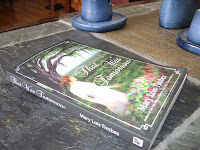 |
| Gardenias from Phil Brady's yard, a few years ago |
|
I was shocked to hear that one of my oldest friends died a less than a week ago. Phil Brady and I had a date or two when we were in high school, and he was one of the good guys all his life. I would see him from time to time, usually when we had a mutual project, but I always liked him and somehow felt he would always be there.
 |
| Phil Brady, 2013 |
He had a big heart, a quick wit, and busied himself with the same kind of projects I did, so it was pretty easy to keep up with him. If he had been ill, and I surmise that he had, he didn't let on. A few months ago I emailed him when I learned of the death of an acquaintance I knew had been in his writer's group, and he responded right away. He had a good sense of the priorities of life, and he lived his life accordingly.
When I had my first job at the
Mobile Press Register, Phil was soon working on the copy desk. By then he was courting the beautiful Catherine, who would become his wife, and finishing college at Spring Hill. He was a strong Catholic, with a questing mind and a commitment to his church and to learning all he could about its history and the history of the world as well.
Like me, he had a career in public relations and journalism, and he retired to Fairhope just about the time I did. There was a period when I was embroiled in the survival of the Organic School, and, although he had not been a part of it before, he studied the situation and met with me on several occasions to offer support and insights. When he read the two books Marietta Johnson wrote, he said this memorable thing, "The difficulty in articulating this philosophy is that at first glance, what she writes sounds simple and basic. But when you think about it you realize how profound it is." The difficult part was inspiring people to think about it.
He and I both wrote novels, interestingly, set in the year 1921. We did not confer on this, nor did either of us see this as more than a coincidence. But I think it shows something of a like mind. That year just seemed to exemplify a time when things were less complex, a safe place where we could explore conflicts beneath the surface of an imagined serenity. My book,
That Was Tomorrow, dealt with Fairhope in its heyday, and his,
The Clarke County Democrats, was about a minor league baseball team in Clarke County, Alabama. I was quite taken with Phil's book, even though my interest in baseball is limited.
The Clarke County Democrats rightly places the game in a day when it was magical. I wrote a review of it on amazon, which I hope sells a few books for him still.
I'm disappointed that he never finished his grand opus--a book of Civil War stories, history, and mythology. I argued with him that the world did not need another book about the Civil War, but I understood his fascination. I too grew up hearing the Southern whitewashed version of history, but I felt burdened by it rather than challenged to retell it. I wish he had lived to see it published. I would love to talk with him about it. He had wonderful stories.







